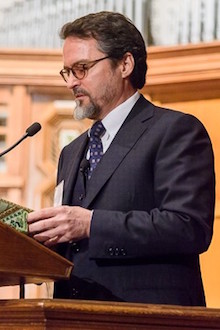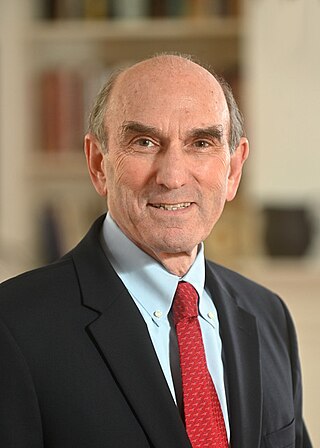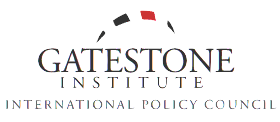
Hamza Yusuf is an American Islamic neo-traditionalist, Islamic scholar, and co-founder of Zaytuna College. He is a proponent of classical learning in Islam and has promoted Islamic sciences and classical teaching methodologies throughout the world.
Political aspects of Islam are derived from the Quran, ḥadīth literature, and sunnah, the history of Islam, and elements of political movements outside Islam. Traditional political concepts in Islam include leadership by elected or selected successors to Muhammad, known as Caliphs in Sunnī Islam and Imams in Shīʿa Islam; the importance of following the Islamic law (sharīʿa); the duty of rulers to seek consultation (shūrā) from their subjects; and the importance of rebuking unjust rulers.

Democratization, or democratisation, is the structural government transition from an authoritarian government to a more democratic political regime, including substantive political changes moving in a democratic direction.

Elliott Abrams is an American politician and lawyer, who has served in foreign policy positions for presidents Ronald Reagan, George W. Bush, and Donald Trump. Abrams is considered to be a neoconservative. He is currently a senior fellow for Middle Eastern studies at the Council on Foreign Relations. He served as the U.S. Special Representative for Venezuela from 2019 to 2021 and as the U.S. Special Representative for Iran from 2020 to 2021.

Noah Raam Feldman is an American legal scholar and academic. He is the Felix Frankfurter Professor of Law at Harvard Law School and chairman of the Harvard Society of Fellows. He is the author of 10 books, host of the podcast Deep Background, and a public affairs columnist for Bloomberg Opinion. He was formerly a contributing writer for The New York Times.

John Louis Esposito is an American academic, professor of Middle Eastern and religious studies, and scholar of Islamic studies, who serves as Professor of Religion, International Affairs, and Islamic Studies at Georgetown University in Washington, D.C. He is also the founding director of the Prince Alwaleed Center for Muslim–Christian Understanding at Georgetown.

Steven David Levitt is an American economist and co-author of the best-selling book Freakonomics and its sequels. Levitt was the winner of the 2003 John Bates Clark Medal for his work in the field of crime, and is currently the William B. Ogden Distinguished Service Professor of Economics at the University of Chicago as well as the Faculty Director and Co-Founder of the Center for Radical Innovation for Social Change at the University of Chicago which incubates the Data Science for Everyone coalition. He was co-editor of the Journal of Political Economy published by the University of Chicago Press until December 2007. In 2009, Levitt co-founded TGG Group, a business and philanthropy consulting company. He was chosen as one of Time magazine's "100 People Who Shape Our World" in 2006. A 2011 survey of economics professors named Levitt their fourth favorite living economist under the age of 60, after Paul Krugman, Greg Mankiw and Daron Acemoglu.

Islam is the major religion in the Gambia, representing 97% of the 2 million population, with the first Muslim communities in the country arriving in 11th century. Islam has therefore had an influence on the Gambia throughout history, and continues to impact its culture, society and politics. The majority of The Gambia's Muslims are Sunni belonging to the Maliki school of jurisprudence, influenced with Sufism. There is a smaller Shiite community, largely stemming from Lebanese and Arab migration. The Ahmadiyya movement is also present. Other religious societies exist in the country, including Catholics, Protestants, Hindus and Traditional African religions.

Vali Reza Nasr is an Iranian-American academic and author, specializing in the Middle East and the Islamic world. He is Majid Khaddouri Professor of International Affairs and Middle East Studies at the Johns Hopkins School of Advanced International Studies (SAIS) in Washington, D.C. He served as the eighth dean of the school from 2012 to 2019. Nasr is also a Non-Resident Fellow in South Asia at Atlantic Council and is described by The Economist as "a leading world authority on Shia Islam".
Andrew C. McCarthy III is an American lawyer and columnist for National Review. He served as an Assistant United States Attorney for the Southern District of New York. A Republican, he led the 1995 terrorism prosecution against Sheikh Omar Abdel-Rahman and eleven others. The defendants were convicted of the 1993 World Trade Center bombing and planning a series of attacks against New York City landmarks. He also contributed to the prosecutions of terrorists who bombed United States embassies in Kenya and Tanzania. He resigned from the Justice Department in 2003.

Brian Porter Kemp is an American politician serving since January 2019 as the 83rd governor of Georgia. A member of the Republican Party, Kemp served as the 27th secretary of state of Georgia from 2010 to 2018, and as a member of the Georgia State Senate from 2003 to 2007.

Sebastian Lukács Gorka is a British-Hungarian-American media host and commentator currently affiliated with Salem Radio Network and NewsMax TV and a former government official who served briefly in the Trump administration as a Deputy Assistant to the President for seven months, from January 2017 until his termination on August 25, 2017. He has written several books.

The Foundation for Defense of Democracies (FDD) is non-profit neoconservative think tank and a registered lobbying organization based in Washington, D.C., United States.

Gatestone Institute is an American conservative think tank based in New York City, known for publishing articles pertaining to U.S. foreign policy in the Middle East, specifically with regard to Islamic extremism. It was founded in 2012 by Nina Rosenwald, who serves as its president. John R. Bolton, former U.S. Ambassador to the United Nations and former National Security Advisor, was its chairman from 2013 until March 2018. Its current chairman is Amir Taheri. The organization has attracted attention for publishing false or inaccurate articles, some of which were shared widely.
Shadi Hamid is an American author and political scientist, who is currently a columnist and member of the Editorial Board at The Washington Post. Previously, he was a longtime senior fellow at the Brookings Institution and a contributing writer at The Atlantic. He also holds the position of research professor of Islamic studies at Fuller Seminary. This appointment is the first time a Muslim scholar has been hired in the school's history. He has been called a "prominent thinker on religion and politics" in the New York Times and was named as one of "The world's top 50 thinkers" in 2019 by Prospect Magazine. He is known for coining the phrase "Islamic exceptionalism" to describe Islam's resistance to secularization and outsized role in public life. The phrase has come under some criticism.

American Muslims often face Islamophobia and racialization due to stereotypes and generalizations ascribed to them. Due to this, Islamophobia is both a product of and a contributor to the United States' racial ideology, which is founded on socially constructed categories of profiled features, or how people seem.

Islamophobia in China refers to the set of discourses, behaviors and structures which express feelings of anxiety, fear, hostility and rejection towards Islam and/or Muslims in China.
Protect Democracy is a nonprofit organization based in the United States. A nonpartisan group, Protect Democracy seeks to check what it believes are authoritarian attacks on U.S. democracy.

Democratic backsliding in the United States has been identified as a trend at the state and national levels in various indices and analyses. Democratic backsliding is "a process of regime change towards autocracy that makes the exercise of political power more arbitrary and repressive and that restricts the space for public contestation and political participation in the process of government selection".















